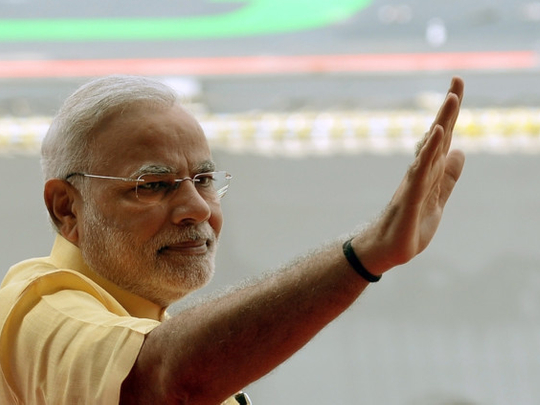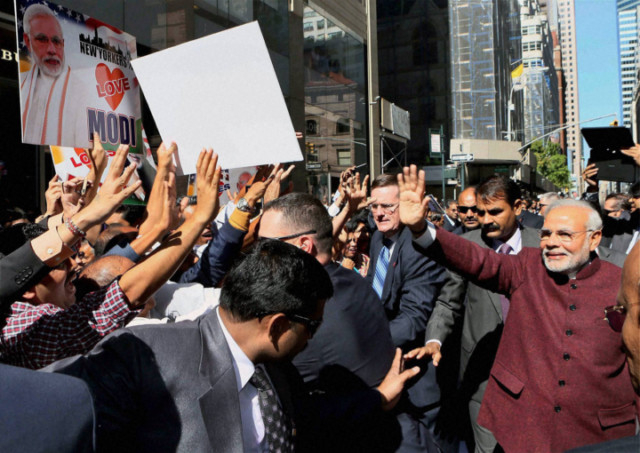
India’s newly-elected Prime Minister Narendra Modi’s maiden visit to the US is all set to make a splash, the buzz almost akin to that of a rockstar. A sold-out event at New York’s Madison Square Garden, host to the likes of Elvis Presley, Sir Elton John and Muhammad Ali, is a first for any foreign leader.
Addressing a 20,000-plus crowd from a rotating platform today, Modi hopes to launch a charm offensive no other Indian Prime Minister has done before. His speech will also be beamed live on giant TV screens at the Times Square with English subtitles and also a toll-free number on the screen that can be dialled to listen to the speech. The organisers of this Modi Show are calling it more of a “Thank You” event for those who supported him during his election campaign. But for many of his admirers in the US, it is no less than a victory-lap on US turf because of Modi’s personal history with the US.
Modi was banned from setting foot on American soil for nearly a decade for failing to prevent riots in the Indian state of Gujarat in 2002. He was the state’s chief minister and under his watch more than a thousand people were killed, most of them Muslims. All that, however, changed after Indian voters brought him to power with a massive mandate this summer. Modi became the Prime Minister of the world’s largest democracy and US President Barack Obama called to congratulate him.
At Obama’s invitation, Modi will have a private dinner with him at the White House, followed by a more formal bilateral meeting on Tuesday. Obama had called the US-India relationship “one of the defining partnerships of 21st century”, but it has barely lived up to its potential.
Too often, US officials have expressed frustration at India’s failure to play a confident leadership role as an emerging economy and become an effective strategic partner. The irony, say experts, is Modi portrays himself as exactly the kind of confident, ambitious and decisive leader the US would want to be on its side in a rapidly changing global order. These analysts believe his narrative of “development for all” and the opportunities that it brings has triggered a competitive courting of sorts amongst world leaders trying to woo him, and Washington has been caught playing catch-up.
The US Secretary of State, John Kerry, and the Defence Secretary, Chuck Hagel, have made back-to-back visits to New Delhi and attempted to build a momentum that went seriously missing in the past few years.
“There are few places in the world other than India and the US where the son of a tea-seller in a small-time town can rise to be the prime minister or the child of a Kenyan father can rise to be president,” was how Hagel put it during his speech in Delhi.
‘Great deal of excitement’
The US Congress has passed a resolution to mark September 30 as US-India Partnership Day. Just days before his visit, the Obama administration nominated an Indian-American to be the ambassador to India, a first in US-India history. While all this may be about optics to a certain extent, the corporate sector also hopes to see some tangibles during the visit. “There is a great deal of excitement that the economic relationship is going to be very different than it has been in the past. It is really groundbreaking,” says Ambassador Susan G. Esserman, former Deputy US Trade Representative.
The current trade relationship between the two countries is close to $100 billion (Dh367.8 billion) and Vice-president Joe Biden hopes it can touch the $500 billion mark in the next five years. A think tank’s latest projection is even more ambitious as it values it at $1 trillion by 2030. But before any of this can become a reality, there are some serious challenges in its way. “There is a deficit of trust. We attempted to do some pretty big things with the last government and found unmet expectations,” says Richard Rossow of the US-India Policy Studies at Centre for Strategic and International Studies. He says on big issues like the nuclear deal and other strategic goals, if things can get back on track and there is a proper follow-through then it will really help.
Trade disputes at the World Trade Organisation, bickering over patent laws and copyrights, threat to blacklist India — on many fronts the two countries appear to be at war than being partners. Foreign direct investment from the US has dried up in the recent years and many big names from the US corporate sector have pulled out of India citing unpredictability in regulations.
India, too, has its share of grievances on immigration laws that restrict US companies in hiring Indian skilled workers. US withdrawal from Afghanistan and its impact on India could further complicate matters. There are many Indians who have lingering suspicion and distrust, particularly of US foreign policy, dating back to the days of non-alignment and India’s closeness to the former Soviet bloc. The arrest and public handcuffing of Devyani Khobragade, India’s deputy consul general in New York, on charges of ill-treating her maid took the relationship to a new low.
Senator John McCain calls this relationship “a laundry list of initiatives” that has “devolved into a transactional one”.
“Too often, we have been overly driven by domestic politics and overly focused on extracting concessions from one another, rather than investing in one another’s success and defining priorities that can bring clarity and common purpose to our action,” said McCain in a recent speech.
While the underpinnings for the relationship are too strong for either side to ignore, Modi is still a big unknown to the Americans. Experts say he is the kind of assertive leader who can rebuild this flagging partnership, but Washington will have to cover a lot of ground to win his trust. And this visit could be a good starting point.
Brajesh Upadhyay works for BBC Hindi and is based in Washington.











